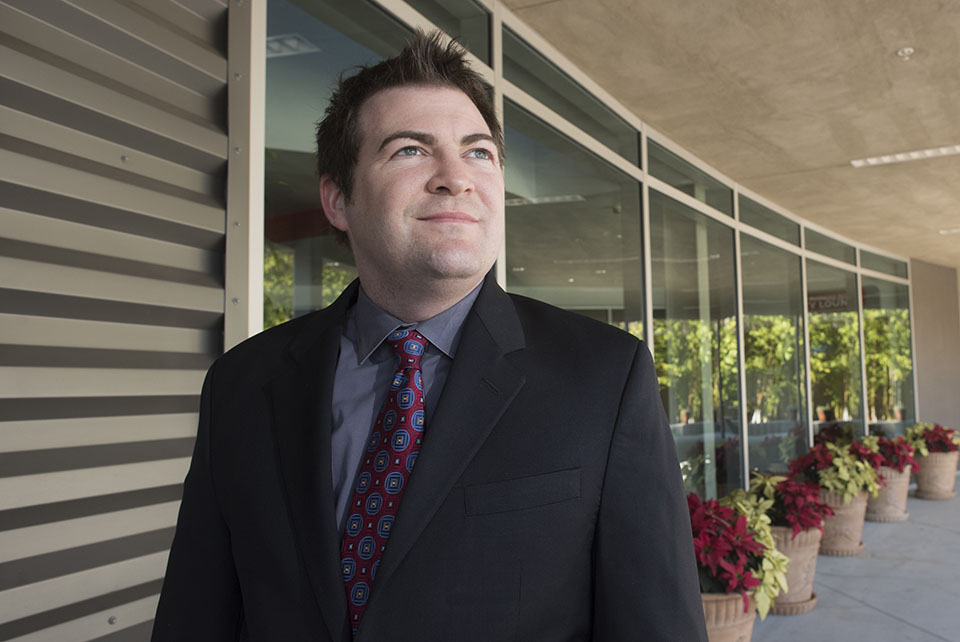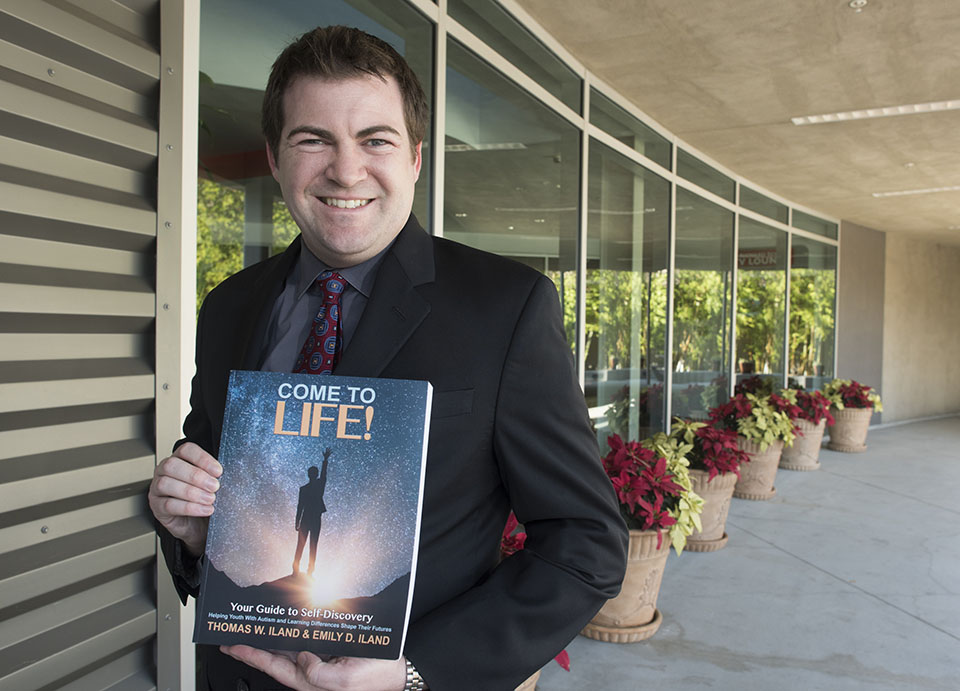CSUN Alumnus Inspires Young People With Autism to Pursue Self-Fulfillment
Whenever Tom Iland ’08 (Accountancy) walks onstage, he wants to captivate his audience. Usually, that doesn’t take him long — he just shows them a trick.
Iland assigns each of the 26 letters in the alphabet a numerical value: A is one, B is two, C is three and so on. He may ask a person in the crowd — say, Cordelia — for her name, and then add up the letters’ numerical values in seconds. While the person is spelling — C-O-R-D-E-L-I-A — Iland is calculating. Cordelia equals 67.
“I have always been good with numbers and figures,” Iland said. “They called me ‘the calculator’ in junior high school because I could add up all those numbers really quickly.”
When Iland was 13, he was diagnosed with autism. His first reaction to his learning difference was denial. After his mom explained the diagnosis to him, Iland sat in his bedroom and cried for an hour.
“I didn’t want to be different, I wanted to be like everybody else,” he said. “But then I figured, it was a relief to finally have a name to my unique quirks and skills.”
When Iland was 3 years old, he would rearrange letter magnets into words on the refrigerator for hours. Later, he would rewind parts of his favorite movies over and over, and find them just as funny.
Repetitive behaviors are a sign of disorders on the autism spectrum. Autism is a developmental disability that can include challenges with social interaction, difficulty with communication skills, or the development of unique strengths and differences — such as Iland’s peculiar ability to calculate the numerical value of letters.
His talent for numbers facilitated his career. When Iland transferred from College of the Canyons to California State University, Northridge in 2005, he decided to pursue a degree in accounting. After graduating, Iland worked as a certified public accountant for seven years. However, he did not feel like he was pursuing his passion.
“I had a little bit of an inkling — maybe I could tell my story about autism,” he said. “Maybe I could inspire my peers that are struggling with autism. Maybe numbers isn’t all the rage.”
Stepping Into an Uncertain Future
In November 2015, Iland quit his job as an accountant and started establishing himself as an autism advocate, guest speaker and Distinguished Toastmaster.
“For the first time in, I think, ever — I felt truly alive,” he said. “I had really found my purpose. This was what I was meant to do with myself.”
With the support of his mother, Emily Iland ’07 (M.A., Special Education), ’09 (Post-Master’s Certificate, Education Therapy), an adjunct professor in the CSUN Department of Special Education, Tom started to share his personal experiences about life on the autism spectrum. The pair spoke at local autism conferences, such as the Autism Society of Los Angeles.
Now, Tom Iland is encouraging others to find their purpose. He recently published his first book, Come to Life! Your Guide to Self-Discovery, which aims to help young people — with or without autism — to find their path in life. Three months after publication, it ranked as an Amazon bestseller in the special education category. On Feb. 12, Iland’s book earned the Mom’s Choice Award, which recognizes family-friendly media and products.
The book includes exercises and activities to help young people develop their full potential. Each chapter consists of a text and exercises. Readers learn how to identify their strengths and challenges, how to put in writing their thoughts and how to create lists that can help them in making decisions.
“The book is based on my mantra: Know yourself, love yourself, be yourself,” Iland said.
“Life doesn’t come to you — it’s up to you to ‘come to life,'” he continued. “You are the one in charge, and you have to speak up and say what you want.”
Iland conducts workshops and gives talks on an array of topics, across the United States and Mexico. He educates on autism awareness basics, how to overcome obstacles such as finding a job or establishing a romantic relationship, transitioning from childhood to adulthood, and tips on how to best explain to children what their disability means. In 2017, Iland had approximately 15 such professional engagements, with groups ranging in size from 20 to 120 people.
Police Safety Education
Iland has worked with nonprofit organizations and companies such as Deloitte and The Walt Disney Company, and he collaborates with the Los Angeles Police Department on a safety program for police interactions with people on the autism spectrum.
“People with autism take things literally,” Iland said. Sarcasm and tone of voice are hard for them to identify, he said. “If police tell a person with autism to hold up their hands where they can be seen, the person literally might start approaching the officer with hands held up.”
To educate young people, Iland and his mother created a series of autism awareness videos called Be Safe — tailored to youth on the autism spectrum — to promote safe police interactions.
“The videos explain what to do and how to behave in a police encounter,” Iland said. For people on the autism spectrum, watching a video is an easier way to learn — especially for exploring the feelings and intentions of other people, he said. Iland himself struggles with relating to situations where he has no prior experience.
“If a thing hasn’t happened to me before, my mind is a blank page,” he said.
CSUN’s Special Accommodations
Iland had to overcome a lot of obstacles to get where he is today. His education at CSUN opened the door to his professional career, he said. He especially valued the extra support he received as an undergraduate, from CSUN’s Disability Resources and Educational Services (DRES).
Being permitted to take tests in a quiet environment was an enormous help for Iland, who got easily distracted by classmates’ noises, he said.
“I’m really grateful that [DRES] was so accommodating and allowed me to take exams in another room or have double time,” he said. “A lot of students don’t have that luxury, or don’t come forward to ask their professors for help.”
In the future, Iland hopes to add empowerment and accountability coaching to his portfolio, to support people in reaching their personal goals.
“I want to start an online consulting business and, ultimately, expand from the autism community, which is only 1 to 2 percent of population,” he said. “I don’t want to miss out on the other 98 percent.”
To learn more about Tom Iland and his work, visit his website http://thomasiland.com.



 experience
experience